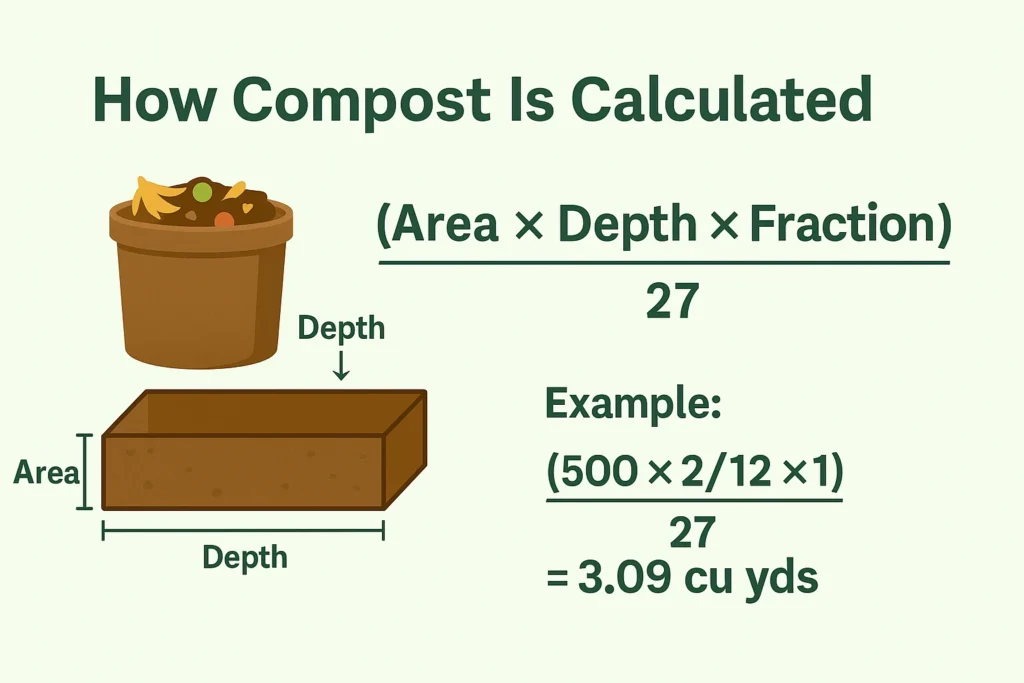Compost Calculator
Compost Calculator

Created by James S. Lockwood
With a background in botany and ecological sciences, James specializes in creating practical tools and resources to help gardeners, farmers, and plant enthusiasts optimize their green spaces.
Use our Compost Calculator to determine the exact amount of compost required based on your area size, compost depth, and soil-to-compost ratio. Whether you’re applying compost as a top dressing, mulch, or soil amendment, our calculator makes the process simple and efficient.
Table of Contents
What is Compost?
Compost is decomposed organic matter—mainly food scraps, yard waste, and natural materials like leaves or straw. Through natural processes involving heat, moisture, oxygen, and microorganisms, these materials break down into a nutrient-rich, dark, soil-like substance. This final product is called finished compost, and it’s full of beneficial microbes and plant-friendly nutrients.
Why Use Compost?
Compost improves soil structure, adds essential nutrients, and boosts microbial activity—making it one of the best soil amendments for gardens, lawns, and landscapes.
Here’s why compost is worth using:
Improves soil health: Increases water retention in sandy soil and improves drainage in clay.
Adds nutrients: Supplies plants with slow-release nutrients like nitrogen, phosphorus, and potassium.
Reduces the need for synthetic fertilizers: Compost naturally boosts soil fertility.
Encourages microbial life: Healthy soil biology supports stronger, more resilient plants.
Reduces waste: Keeps kitchen and yard waste out of landfills.
Whether you’re topdressing a lawn, enriching a raised bed, or prepping a new garden, compost helps build a foundation for better growth.
How do I calculate how much compost I need?
Getting the right amount of compost is important to avoid overusing or falling short. Use this formula to calculate how much compost you need in cubic yards:
Compost Volume Formula:
(Area × Depth in Feet × Compost Fraction) ÷ 27
Area = total square feet of your lawn or garden
Depth in Feet = compost depth in inches ÷ 12
Compost Fraction =
Use 1 if applying compost alone
Use a decimal (like 0.25) if mixing compost with soil
(e.g., 1 part compost in 4 parts soil = 1/5 = 0.2)
27 = number of cubic feet in one cubic yard
Example:
You’re covering 500 sq ft with 2 inches of compost (pure, not mixed).
(500 × (2 ÷ 12) × 1) ÷ 27 = 3.09 cubic yards

Calculate Compost for Garden Beds
Garden beds require a balanced mix of compost and soil to improve nutrient levels and soil structure. The ideal depth of compost for garden beds depends on its application:
- Soil Amendment: Mix 2 to 3 inches of compost into the top 6-8 inches of soil.
- Mulching: Apply a 1 to 3-inch layer of compost on top of the soil to suppress weeds and retain moisture.
- Raised Beds: Mix compost into the garden soil at a 3:1 soil-to-compost ratio.
How to Use the Compost Calculator for Garden Beds?
- Enter the garden bed area (sq ft).
- Select the recommended compost depth based on application type.
- Choose the garden bed soil-to-compost ratio (e.g., 3:1 for raised beds).
- The calculator will determine the exact compost volume needed in cubic yards.
✅ Example:
A 4 ft x 8 ft raised bed (32 sq ft) with a 2-inch compost depth using a 3:1 soil-to-compost ratio would need approximately 0.2 cubic yards of compost.
For more tips on how to get started with composting, check out this guide on composting at home from the EPA.
Compost to Soil Ratio Calculator
A Compost to Soil Ratio Calculator helps you determine how much compost to mix with soil for different applications:
🔹 Garden Soil Improvement:
- Mix 1 part compost with 3-4 parts soil for better structure and fertility.
🔹 Potting Mix:
- Combine 1 part compost with 2 parts soil and 1 part sand/perlite for aeration.
🔹 Vegetable Garden:
- Use 30-50% compost in soil for optimal plant growth.
How to Use the Compost to Soil Ratio Calculator:
- Select your compost-to-soil ratio (e.g., 4:1, 3:1, or 2:1).
- Enter the total soil volume needed.
- The calculator will determine the amount of compost required.
✅ Example Calculation:
If you need 10 cubic yards of soil and want a 4:1 soil-to-compost ratio, the calculator will recommend 2 cubic yards of compost.
Compost Application Rate Calculator
Different compost application types require varying depths:
Top Dressing (Lawns)
📏 ¼ - ½ inch
Mulching (Garden Beds)
📏 1 - 3 inches
Soil Amendment
📏 2 - 3 inches
Raised Bed Gardening
📏 3:1 or 4:1 soil-to-compost ratio
How to Use the Compost Application Rate Calculator?
- Choose application type (Top Dressing, Mulching, Soil Amendment).
- The calculator auto-fills the recommended depth based on your selection.
- Enter the lawn/garden area (sq ft).
- It calculates the compost volume needed instantly.
💡 Example:
For a 1,000 sq ft lawn applying ½ inch top dressing, the compost needed is:
👉 (1000 × (0.5/12)) ÷ 27 = 1.54 cubic yards.
Compost Volume Needed for Lawn
Lawns benefit greatly from compost top dressing to improve soil health, boost microbial activity, and enhance water retention.
Recommended Compost Depth for Lawns:
- New Lawns (Before Seeding): 1 to 2 inches of compost tilled into soil.
- Existing Lawns (Top Dressing): ¼ to ½ inch of compost spread evenly.
How to Calculate Compost Volume for Lawns:
- Enter lawn area (sq ft).
- Select the depth of compost (¼, ½, or 1 inch).
- The calculator determines the total compost volume in cubic yards.
✅ Example Calculation:
A 5,000 sq ft lawn with a ¼-inch compost top dressing needs:
👉 (5000 × (0.25/12)) ÷ 27 = 3.86 cubic yards of compost.
Why Use a Compost Calculator?
✔️ Saves Time & Money – Avoid buying too much or too little compost.
✔️ Precision in Application – Get the correct compost depth and ratio for your needs.
✔️ Boosts Soil Health – Ensures optimal organic matter for plants and microbes.
✔️ Reduces Waste – Prevents overuse of compost, conserving natural resources.
Other Helpful Calculators for Your Garden Project
Once you know how much compost you need, you may want to calculate other materials commonly used alongside it. These tools can help you plan your full setup with precision:
Soil Calculator
If you’re mixing compost with topsoil or filling raised beds, this calculator helps you figure out the exact soil volume you’ll need based on your garden’s size and depth.Mulch Calculator
Planning to mulch over your compost layer? This tool estimates how much mulch to buy for proper coverage, moisture retention, and weed control.Garden Bed Planner
Building or planting raised beds? This tool helps you lay out dimensions, spacing, and materials—including compost, soil, and space between plants.
FAQs About Using a Compost Calculator
1. How much compost do I need for my garden?
It depends on your garden size and compost depth. Use our calculator to get the exact amount in cubic yards.
2. What is the best compost-to-soil ratio?
For general gardening, a 3:1 or 4:1 soil-to-compost ratio works best. Raised beds can use up to 50% compost.
3. Can I use compost as mulch?
Yes! Apply 1 to 3 inches of compost as a mulch layer to suppress weeds and retain moisture.
4. How often should I apply compost to my lawn?
Top dress your lawn once or twice per year with ¼ to ½ inch of compost for best results.
5. What’s the best compost depth for a vegetable garden?
Mix 2 to 3 inches of compost into the soil for healthy vegetable growth.
Disclaimer for Compost Calculator
The calculations provided by this Compost Calculator are for estimation purposes only. Actual compost requirements may vary based on soil conditions, compost quality, and specific application methods. Always consult a gardening professional or soil expert for precise recommendations. We do not assume liability for any discrepancies in compost application or purchasing decisions.
Discover Crop & Farming Calculators
